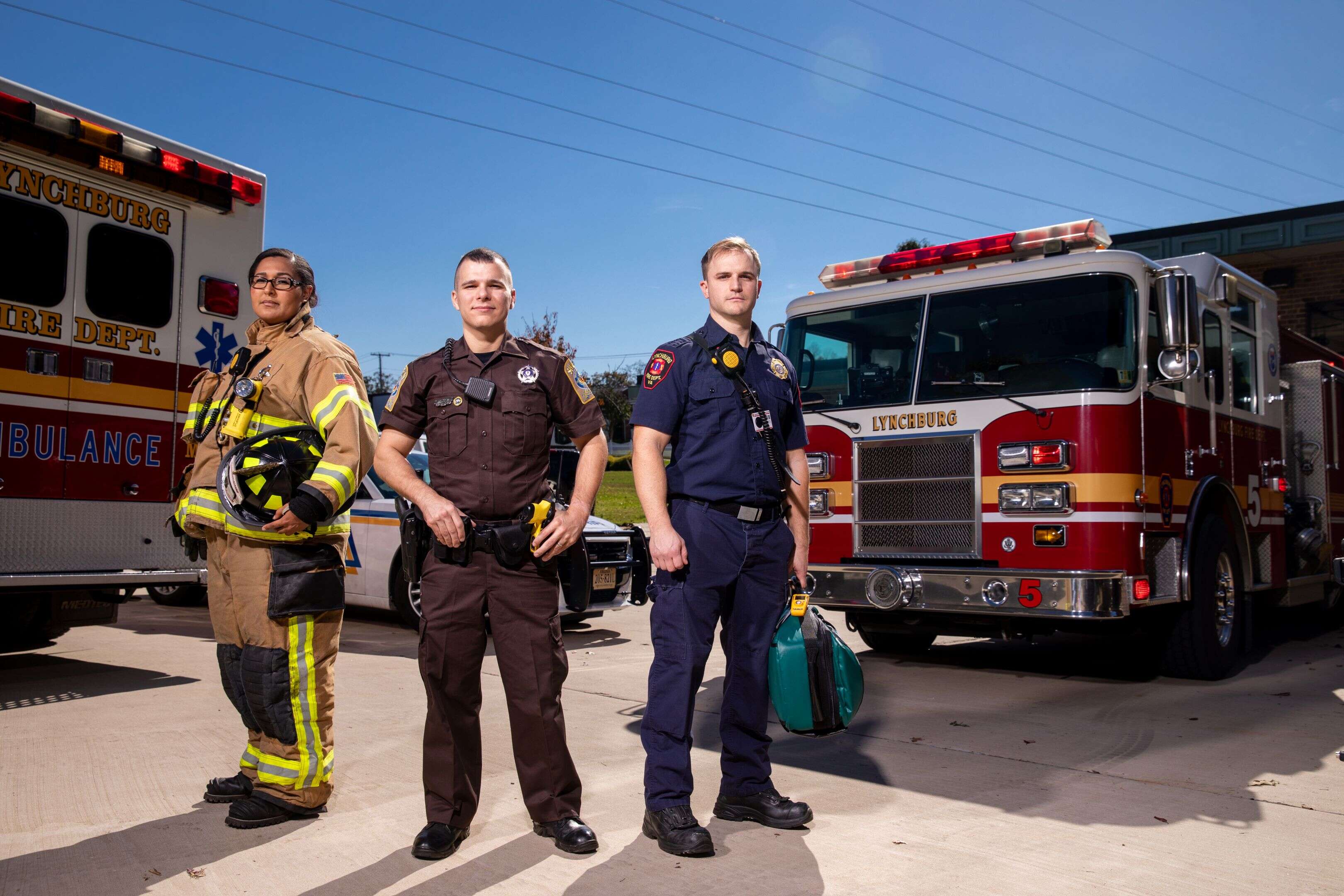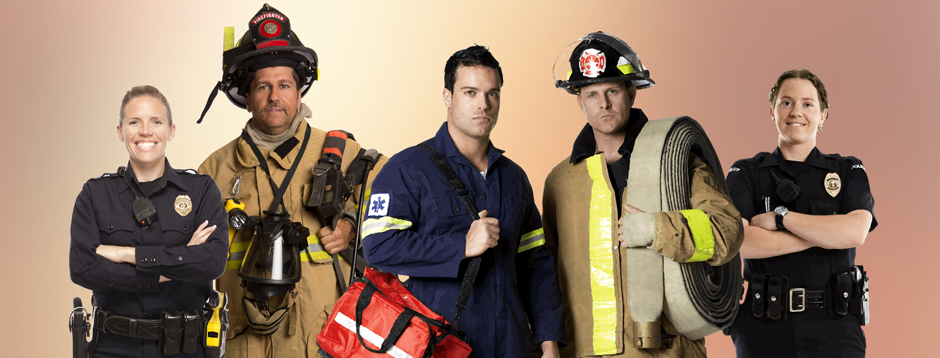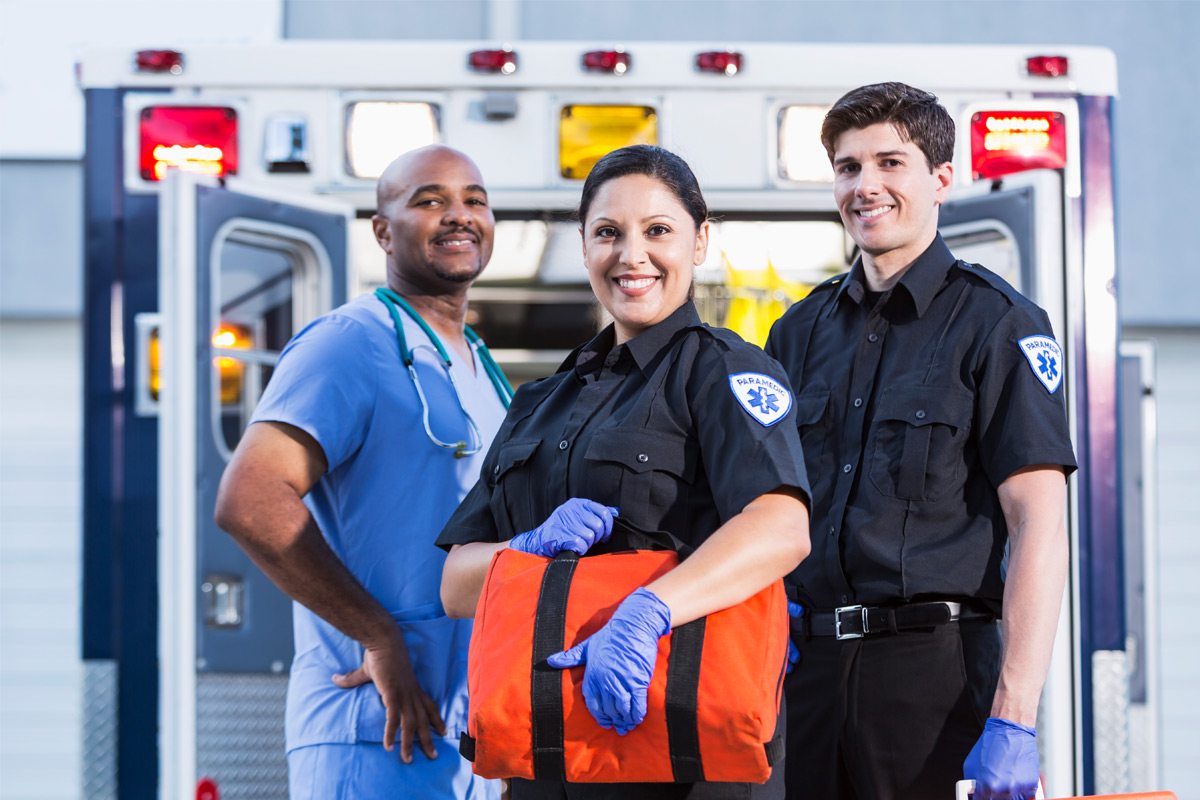Are security officers considered first responders? This question sparks debate, as the lines between traditional first responders and security personnel blur in today’s complex world. While often seen as guardians of order, security officers increasingly find themselves responding to emergencies, navigating ethical dilemmas, and collaborating with emergency services. Their role in public safety is multifaceted, and understanding their position within the first responder spectrum is crucial.
This exploration delves into the definition of first responders, the duties and responsibilities of security officers, and the overlapping areas where their roles intersect. We will examine the legal and regulatory framework governing security officers, as well as the ethical considerations they face in emergency situations. Finally, we’ll explore the public perception of security officers and discuss strategies for improving public awareness of their critical contributions.
Definition of First Responders

First responders are individuals who are trained and equipped to provide immediate assistance at the scene of an emergency. They are often the first point of contact for individuals in need, and their actions can have a significant impact on the outcome of an emergency situation. First responders play a crucial role in saving lives and mitigating damage during emergencies.
They are trained to assess situations quickly, provide immediate care, and ensure the safety of those involved.
Types of First Responders
First responders come from various backgrounds and professions, each specializing in specific areas of emergency response. Here are some common types of first responders:
- Police Officers: Law enforcement officers are responsible for maintaining order, enforcing laws, and protecting citizens. They are often the first to arrive at emergency scenes and may be involved in controlling crowds, securing the area, and providing initial medical assistance.
- Firefighters: Firefighters are trained to extinguish fires, rescue individuals trapped in fires or other emergencies, and provide medical assistance. They are equipped with specialized equipment and vehicles to respond to various emergencies, including fires, vehicle accidents, and natural disasters.
- Emergency Medical Technicians (EMTs) and Paramedics: EMTs and paramedics are trained to provide advanced medical care, including administering medications, performing CPR, and transporting patients to hospitals. They are typically dispatched to emergencies involving medical emergencies, accidents, and other situations where immediate medical attention is required.
- Emergency Dispatchers: Emergency dispatchers are responsible for receiving emergency calls, assessing the situation, and dispatching the appropriate first responders. They play a crucial role in coordinating emergency response efforts and ensuring that help arrives quickly and efficiently.
Security Officer Roles and Responsibilities

Security officers play a crucial role in maintaining order, safety, and security in various settings. Their responsibilities encompass a wide range of tasks, depending on the specific environment and the organization’s needs.
Primary Duties of Security Officers
Security officers perform a variety of tasks to ensure the safety and security of individuals and property. Their duties vary depending on the specific setting, such as schools, hospitals, businesses, or events.
- Patrolling: Security officers patrol assigned areas on foot, in vehicles, or using surveillance systems to deter crime and identify potential threats. They observe suspicious activities, monitor access points, and respond to incidents.
- Access Control: Security officers control access to buildings, facilities, and events. They verify identification, screen visitors, and enforce security protocols to prevent unauthorized entry.
- Incident Response: Security officers are trained to respond to emergencies and security breaches. They may be responsible for first aid, fire suppression, or evacuations. They also investigate incidents, gather evidence, and provide reports.
- Security Measures: Security officers implement and maintain security measures, such as installing surveillance cameras, alarms, and access control systems. They also conduct security audits and inspections to identify vulnerabilities and ensure compliance with safety regulations.
- Customer Service: Security officers interact with visitors, employees, and members of the public. They provide information, answer questions, and resolve conflicts in a professional and courteous manner.
Contributions to Safety and Security
Security officers contribute significantly to safety and security by:
- Deterrence: Their presence and visible patrols discourage criminal activity and provide a sense of security to those present.
- Early Detection: They can identify potential threats and security breaches early on, enabling timely intervention and prevention of incidents.
- Incident Response: Their training and skills allow them to effectively respond to emergencies and security breaches, minimizing damage and ensuring the safety of individuals.
- Enforcing Regulations: They enforce security protocols and regulations, ensuring compliance and maintaining order in various settings.
- Building Trust: They foster a sense of security and trust among employees, visitors, and members of the public by providing a visible presence and responding to concerns.
Skills and Training, Are security officers considered first responders
Security officers require specific skills and training to perform their duties effectively.
- Communication Skills: Effective communication is essential for security officers to interact with individuals, convey information, and de-escalate situations.
- Observation and Awareness: They need keen observation skills to detect suspicious activities, identify potential threats, and assess situations accurately.
- Physical Fitness: Security officers must be physically fit to perform patrols, respond to incidents, and handle physical confrontations if necessary.
- First Aid and CPR: They are often required to have basic first aid and CPR training to provide immediate assistance in emergencies.
- Legal Knowledge: Security officers need to understand basic legal principles related to security, law enforcement, and criminal justice.
- Technology Proficiency: They may be required to operate surveillance systems, access control systems, and other security technologies.
- Problem-Solving Skills: Security officers need to be able to analyze situations, identify potential risks, and develop solutions to ensure safety and security.
Overlapping Responsibilities

Security officers and first responders often share responsibilities, particularly in emergency situations. While their roles and training may differ, their shared goal is to protect life and property, and they often work together to achieve this.
Areas of Shared Responsibility
Security officers and first responders share responsibilities in various areas, including:
- Initial Incident Response: Both security officers and first responders are typically the first to arrive at an emergency scene. Security officers may be the first to encounter a situation, while first responders are dispatched to the scene upon receiving a call.
- Scene Control and Safety: Both parties are responsible for securing the scene and ensuring the safety of individuals involved. This may involve controlling access, directing traffic, and assisting with evacuation.
- Providing Aid and Assistance: Security officers are often trained in basic first aid and may provide initial assistance to injured individuals. First responders are trained in advanced medical care and are equipped to provide life-saving interventions.
- Communication and Reporting: Both security officers and first responders play a crucial role in communicating information about the incident to relevant authorities. They may gather information, document events, and relay details to dispatchers, law enforcement, or other emergency personnel.
- Security Measures: Security officers are responsible for maintaining security measures and protocols. In emergency situations, they may implement additional security measures to protect property and individuals. First responders also play a role in ensuring security, particularly in protecting the scene and maintaining order.
Roles in Emergency Situations
While both security officers and first responders are crucial in emergency situations, their roles and responsibilities differ:
- Security Officers:
- Act as the initial point of contact, assessing the situation and contacting appropriate authorities.
- Implement security protocols, control access to the scene, and maintain order.
- Provide basic first aid and assistance to injured individuals.
- Gather information, document events, and communicate with authorities.
- First Responders:
- Respond to emergencies, providing advanced medical care and life-saving interventions.
- Assess the scene, determine the extent of the emergency, and prioritize actions.
- Coordinate with other emergency personnel, including law enforcement and fire services.
- Transport injured individuals to medical facilities.
Collaboration and Communication
Effective collaboration and communication between security officers and first responders are crucial in emergency situations. This includes:
- Sharing Information: Security officers can provide first responders with valuable information about the incident, such as the location of the emergency, potential hazards, and the number of individuals involved.
- Coordination of Efforts: Security officers can assist first responders in controlling the scene, managing crowds, and ensuring the safety of individuals.
- Joint Operations: Security officers and first responders may work together to perform tasks such as evacuations, searches, and security checks.
- Clear Communication Channels: Establishing clear communication channels between security officers and first responders is essential to ensure a coordinated response.
Legal and Regulatory Considerations
The legal status of security officers and their authority vary significantly depending on the jurisdiction. Understanding these legal frameworks is crucial for both security officers and employers to ensure compliance and avoid potential legal issues.
Legal Status and Authority
Security officers are generally considered private citizens with limited legal authority. They are not law enforcement officers and do not have the same powers as police officers. However, they may be granted specific powers by state or local laws, such as the authority to detain individuals suspected of criminal activity or to enforce private property rules.
- Statutory Authority: Security officers’ powers are typically defined by state statutes or local ordinances. These laws may grant them limited authority to detain individuals, issue citations, or use force in specific circumstances. For example, in some states, security officers may be authorized to detain individuals suspected of shoplifting or trespassing.
- Private Property Rights: Security officers are generally authorized to enforce the rules and regulations of the property they are protecting. This may include enforcing no-trespassing rules, controlling access to restricted areas, and ejecting individuals who are causing disturbances.
- Use of Force: The use of force by security officers is strictly regulated and generally limited to self-defense or the defense of others. Security officers may be authorized to use reasonable force to prevent a crime, but they must be able to justify their actions and demonstrate that they acted within the bounds of the law.
Training and Certification Requirements
Training and certification requirements for security officers vary widely from state to state. Some states have minimum training requirements, while others have more comprehensive certification programs. First responders, on the other hand, typically undergo extensive training and certification programs, often involving specialized skills and knowledge in emergency medical care, fire suppression, and law enforcement.
- Security Officer Training: Security officer training programs typically cover topics such as security procedures, report writing, communication skills, and de-escalation techniques. They may also include training on the use of force, firearms, and other security equipment.
- First Responder Training: First responder training programs are more comprehensive and often involve specialized skills and knowledge. For example, EMTs receive training in emergency medical care, including CPR, first aid, and the use of medical equipment. Firefighters receive training in fire suppression, rescue operations, and hazardous materials handling. Law enforcement officers receive training in criminal investigation, arrest procedures, and the use of firearms.
Legal Implications of Responding to Emergencies
The legal implications of security officers responding to emergencies are complex and can vary depending on the circumstances. While security officers may be encouraged to assist in emergencies, they should be aware of their legal limitations and avoid exceeding their authority.
- Duty to Act: Security officers generally do not have a legal duty to act in emergencies. However, they may be held liable for negligence if they fail to act reasonably in a situation where they have a duty to act. For example, a security officer may be held liable for negligence if they fail to provide reasonable assistance to a person who is being assaulted.
- Good Samaritan Laws: Many states have Good Samaritan laws that protect individuals who provide emergency assistance from civil liability. However, these laws may not apply to security officers who are acting within the scope of their employment.
- Exceeding Authority: Security officers should be aware of their legal limitations and avoid exceeding their authority when responding to emergencies. For example, they should not attempt to make arrests or use force unless authorized by law. They should also avoid giving medical advice or providing emergency medical care unless they are qualified to do so.
Ethical Considerations: Are Security Officers Considered First Responders
Security officers, particularly in emergency situations, often face ethical dilemmas that require them to balance their responsibilities with their personal values. These dilemmas can be complex and require careful consideration to ensure that their actions are both lawful and morally sound.
Professionalism and De-escalation Techniques
Professionalism is paramount for security officers, especially when dealing with individuals in distress or exhibiting aggressive behavior. It involves maintaining a calm and composed demeanor, communicating clearly and respectfully, and avoiding actions that could escalate the situation. De-escalation techniques, such as active listening, empathy, and using a calm and reassuring tone, are essential tools for security officers to diffuse potentially volatile situations.
These techniques aim to reduce tension and prevent the use of force, fostering a more peaceful resolution.
Ethical Considerations Related to the Use of Force
The use of force by security officers is a complex issue with significant ethical implications. Security officers have a duty to protect life and property, but they must also act within the bounds of the law and ethical principles. Ethical considerations related to the use of force include:
- Proportionality: The force used should be proportionate to the threat posed. This means using the least amount of force necessary to control the situation and protect individuals. For example, if a person is verbally abusive, using physical force would be disproportionate.
- Necessity: The use of force should be necessary to prevent imminent harm or a serious crime. It should not be used as a punishment or to assert authority.
- Reasonable Belief: Security officers must have a reasonable belief that force is necessary. This means they must have a justifiable reason to believe that a person poses a threat to themselves or others.
- Duty to Retreat: In some jurisdictions, security officers have a duty to retreat if it is safe to do so. This means they should avoid using force if there is a safe way to de-escalate the situation.
- Duty to Intervene: Security officers have a duty to intervene to prevent harm to others, even if it means using force. This duty is often referred to as the “duty to rescue.”
Public Perception and Awareness
The public’s perception of security officers significantly impacts their effectiveness. Public understanding of their role, responsibilities, and limitations is crucial for fostering trust and cooperation.
Media Portrayals and Public Perception
Media portrayals often shape public perception of security officers. While some depictions may be accurate, others can perpetuate negative stereotypes or create unrealistic expectations. For instance, movies and television shows frequently portray security officers as incompetent, overly aggressive, or corrupt, leading to a distorted view of their actual roles and responsibilities.
Strategies for Improving Public Awareness
Several strategies can help improve public awareness of the contributions of security officers:
- Public Relations Campaigns: Security organizations can launch public relations campaigns to highlight the positive aspects of their work, such as crime prevention, safety protocols, and community engagement. These campaigns can use various media platforms, including social media, websites, and traditional media outlets, to reach a wider audience.
- Community Outreach Programs: Security officers can actively participate in community outreach programs to build relationships with residents and businesses. This can involve attending community events, participating in neighborhood watch programs, and offering safety tips and advice.
- Educational Programs: Security organizations can partner with schools, community centers, and other institutions to offer educational programs about security practices and the role of security officers. These programs can help dispel misconceptions and provide a better understanding of their work.
- Professional Development: Security officers should be encouraged to pursue professional development opportunities to enhance their skills and knowledge. This can include training in de-escalation techniques, conflict resolution, and customer service, which can improve their interactions with the public.
The question of whether security officers are first responders remains complex and nuanced. While they may not always be formally recognized as such, their increasing involvement in emergency situations underscores their vital role in public safety. Their skills, training, and commitment to protecting lives and property make them integral partners in maintaining order and ensuring community well-being. As we navigate an increasingly complex world, recognizing the evolving role of security officers and fostering greater understanding of their contributions is essential for building a safer and more secure society.
FAQ Overview
What are the typical qualifications for a security officer?
Security officers typically require a high school diploma or equivalent, along with specific training and certifications. These certifications often include first aid, CPR, and de-escalation techniques. Specific requirements may vary depending on the jurisdiction and employer.
Do security officers have the same legal authority as police officers?
Security officers generally have limited legal authority. Their powers are often defined by state or local laws and may include the ability to detain individuals suspected of criminal activity, but they cannot make arrests or use force in the same way as law enforcement officers.
How can I improve public perception of security officers?
Building positive public perception requires proactive engagement. Security professionals can participate in community events, collaborate with local law enforcement, and actively promote their role in public safety. Open communication and transparency are key to fostering trust and understanding.






